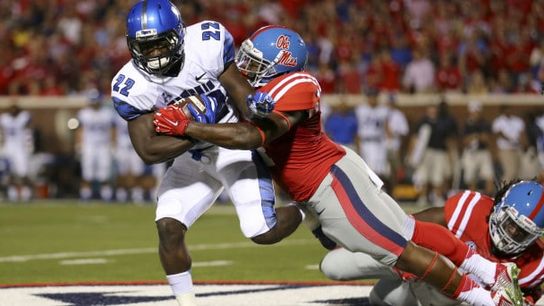Like the SEC and the ACC before it, the Big Ten will now require its member schools to schedule at least one Power Five non-conference opponent. Paired with the conference's mandate to play nine league games and no FCS opponents beginning next season, it's clear Jim Delany's league has clear intentions to provide its teams, fans and television partners with compelling, challenging schedules. They should be commended for that.
Problem is, it's now time to scrap nearly all of it.
Brett McMurphy of ESPN.com reported this Tuesday:
Notre Dame? That's an exception so obvious it doesn't need to be mentioned. BYU? That's fine. Cincinnati? Sure. Army? CONNECTICUT? What happened here?
Again, the intention is clear and admirable, but the implementation has completely missed the mark. It's only a matter of time before Boise State, Navy, Air Force and the entire American conference receive the same waivers as Army and UConn, rendering the entire blanket policy useless.
Which would be a good thing, because it is.
Non-conference scheduling, as it presently stands, is an act of throwing a dart in a hurricane. You load up and give it your best shot, but in the end you have no control of whether or not you actually nail your target.
Conference commissioners want to ensure their schools put themselves in the best possible position to succeed, which is why these blanket policies sound good in the boardroom,��but they lead to Georgia State somehow being deemed a more valuable opponent than North Dakota State, or Kansas a more worthy opponent than Memphis, despite the fact the Tigers beat the Jayhawks by 32 on Sept. 12. And as an unintended consequence, it leads to Oklahoma and LSU scheduling a home-and-home for 2028-29. Sure, there's a chance both teams are on the same level they were when they met for the 2003 national title. Or, equally possible, they could both be as they were in 1994, when the Sooners and Tigers went a combined 10-13. We don't have any idea, because the players who will make the deciding plays in those games are currently in first grade.
For the most important question: does this actually accomplish anything? The answer, clearly, is no. Poll voters can make a clear distinction between Kansas and Memphis, and so can the College Football Playoff selection committee.
This season's Memphis actually serves as the perfect example for how sideways these policies truly are. Just two years removed from a string of seven losing seasons in eight tries, the Fighting Justin Fuentes are 13-3 since the beginning of the 2014 season and will likely run that mark to 15-3 before No. 3 Ole Miss visits the Liberty Bowl on Oct. 17 for the biggest Memphis football game anyone can remember. A one-point win over those Tigers would do infinitely more for Ole Miss (and, in turn, the SEC) than a 100-point demolition of Kansas. And yet KU satisfies the SEC's Power Five requirement and Memphis doesn't.
Sure, Memphis can receive the same waiver UConn and Army got. They're certainly more deserving. And under the typical college football thinking, some ambitious Power Five team can schedule the Tigers for 2021, just in time for Fuente to take another job and Memphis to revert back to its normal self. Which solves absolutely nothing.
It's beyond time college football blows up the current system and borrows from its hardwood sibling and begins scheduling games only one to two years in advance. Then, instead of opening against a Texas team that has no business playing a national title contender on the road, Notre Dame can challenge itself against a TCU team that was a mess two years ago, but entered 2015 with the same national championship aspirations as the Irish.
Again, the thinking the Big Ten, SEC and ACC have shown is good. Intriguing non-conference games serve players, fans and broadcast partners equally. They're just going about it in an all wrong.
